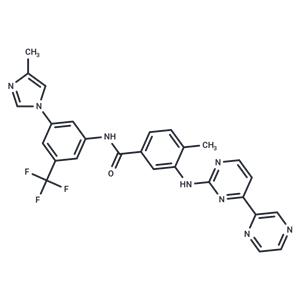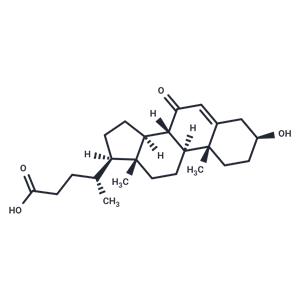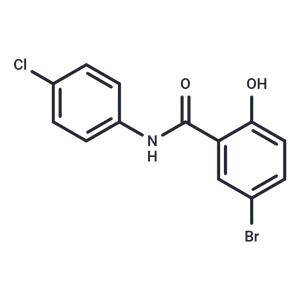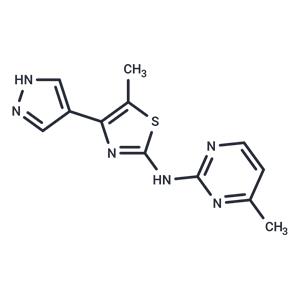
Radotinib NEW
| Price | $39 | $59 | $122 |
| Package | 5mg | 10mg | 25mg |
| Min. Order: | |
| Supply Ability: | 10g |
| Update Time: | 2024-11-19 |
Product Details
| Product Name: Radotinib | CAS No.: 926037-48-1 |
| Purity: 99.97% | Supply Ability: 10g |
| Release date: 2024/11/19 |
Product Introduction
Bioactivity
| Name | Radotinib |
| Description | Radotinib (IY-5511), and sometimes referred to by its investigational name IY5511, is a drug for the treatment of different types of Y, most notably Philadelphia chromosome-positive (Ph+) chronic myeloid leukemia (CML) with resistance or intolerance of other tyrosine kinase Bcr-Abl inhibitors |
| Cell Research | Cells are seeded in 96-well plates at a density of 2×104 cells/ml with 100 μL of medium per well and then incubated with various concentrations of radotinib (0, 1, 10, and 100 μM) for 72 h at 37°C. The CellTiter 96 solution (20 μL) is added directly to each well and plates are incubated for 4 h in a humidified 5% CO2 atmosphere at 37°C. Absorbance is measured with a PowerWave XS2 Microplate Spectrophotometer at 490 nm and the results are expressed as percentage changes from the basal condition using four to five culture wells for each experimental treatment. In some experiments, HL60 cells are cultured with 100 nM ATRA and 1 μM dasatinib for 4 days, and 10 μM radotinib is added to each group according to the planned schedule(Only for Reference) |
| Kinase Assay | Autophosphorylation of EGFR in cells: For experiments using cells in culture, A431 cells are treated with various concentrations of Pelitinib for 2.75 hours before co-incubation with 100 ng/mL EGF for 0.25 hour. Cells are washed twice with cold phosphate-buffered saline (PBS) before adding to lysis buffer (10 mM Tris, pH 7.5, 5 mM ethylenediamine tetra-acetic acid (EDTA), 150 mM NaCl, 1% Triton X-100, 1% Sodium deoxycholate, 0.1 % SDS, 1 mM PMSF, 10 mg/mL pepstatin A, 10 mg/mL leupeptin, 20 KIU/mL aprotinin, 2 mM sodium orthovanadate, and 100 mM sodium fluoride) for 20 minutes on ice, before immunoprecipitation and SDS-PAGE-immunoblotting. For immunoprecipitation, cultured cells are placed in cold lysis buffer and immediately homogenized on ice with a polytron with several pulses. The homogenate is first centrifuged at 2500 rpm (20 minutes, 4 °C) and then again at 14,000 rpm in a microcentrifuge (10 minutes, 4 °C). Supernatants (1000 μg protein) are incubated for 2 hours at 4 °C with 15 mL of EGFR polyclonal antibody. After 2 hours, 50 μL of protein G plus/protein A agarose beads is added and incubated with constant rotation for 2 hours at 4 °C. After washing with lysis buffer, beads are boiled for 2 minutes in Laemmli sample buffer. Proteins are then resolved by SDS-PAGE, transferred to immobilon membrane and probed overnight with an anti-phosphotyrosine antibody conjugated with horseradish peroxidase (HRP). Membranes are developed using the ECL reagent. Total EGFR protein is determined by stripping membranes and re-probing with receptor-specific antibodies. Quantitation of bands is done by densitometry, using ImageQuant software with a Molecular Dynamics laser transmittance scanner. |
| In vitro | In vitro, Radotinib binds BCR-ABL1 and reduces phosphorylation of CrkL, a BCR-ABL1 target protein. Radotinib also effectively inhibits the proliferation of common mutant clones of BCR-ABL1, with the exception of T315I. [1] In AML cells, radotinib significantly decreases the cell viability, promotes differentiation, and induces CD11b expression and apoptosis. In NB4, THP-1, and Kasumi-1 cells, radotinib also induces CD11b expression, and decreases the viability. [2] |
| Storage | Powder: -20°C for 3 years | In solvent: -80°C for 1 year | Shipping with blue ice. |
| Solubility Information | Ethanol : < 1 mg/mL (insoluble or slightly soluble) DMSO : 5.3 mg/mL (10 mM) |
| Keywords | IY5511 | IY 5511 | Radotinib |
| Inhibitors Related | Dasatinib | Imatinib |
| Related Compound Libraries | Bioactive Compound Library | Kinase Inhibitor Library | Drug Repurposing Compound Library | Inhibitor Library | FDA-Approved Kinase Inhibitor Library | Anti-Cancer Approved Drug Library | Anti-Cancer Drug Library | Anti-Cancer Active Compound Library |
Company Profile Introduction
Target Molecule Corp. (TargetMol) is a global high-tech enterprise, headquartered in Boston, MA, specializing in chemical and biological research product and service to meet the research needs of global customers.
TargetMol has evolved into one of the biggest global compound library and small molecule suppliers and a customer based on 40+ countries. TargetMol offers over 80 types of compound libraries and a wide range of high-quality research chemicals including inhibitors, activator, natural compounds, peptides, inhibitory antibodies, and novel life-science kits, for laboratory and scientific use. Besides, virtual screening service is also available for customers who would like to conduct the computer-aided drug discovery.
You may like
Recommended supplier
| Product name | Price | Suppliers | Update time | |
|---|---|---|---|---|
| $1.00/1KG |
VIP6Y
|
Career Henan Chemical Co
|
2019-12-25 |
- Since: 2011-01-07
- Address: 36?Washington?Street, Wellesley?Hills
INQUIRY







 United States
United States